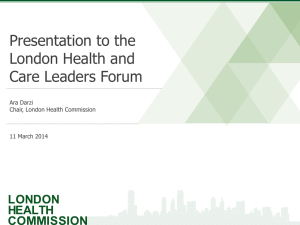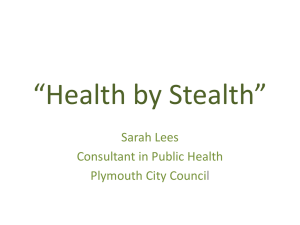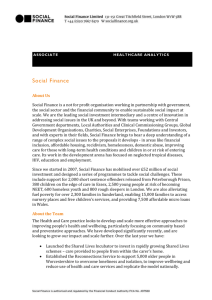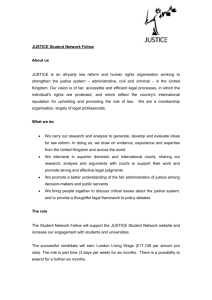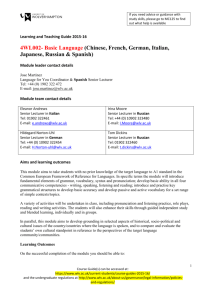Mental health response flow chart
advertisement
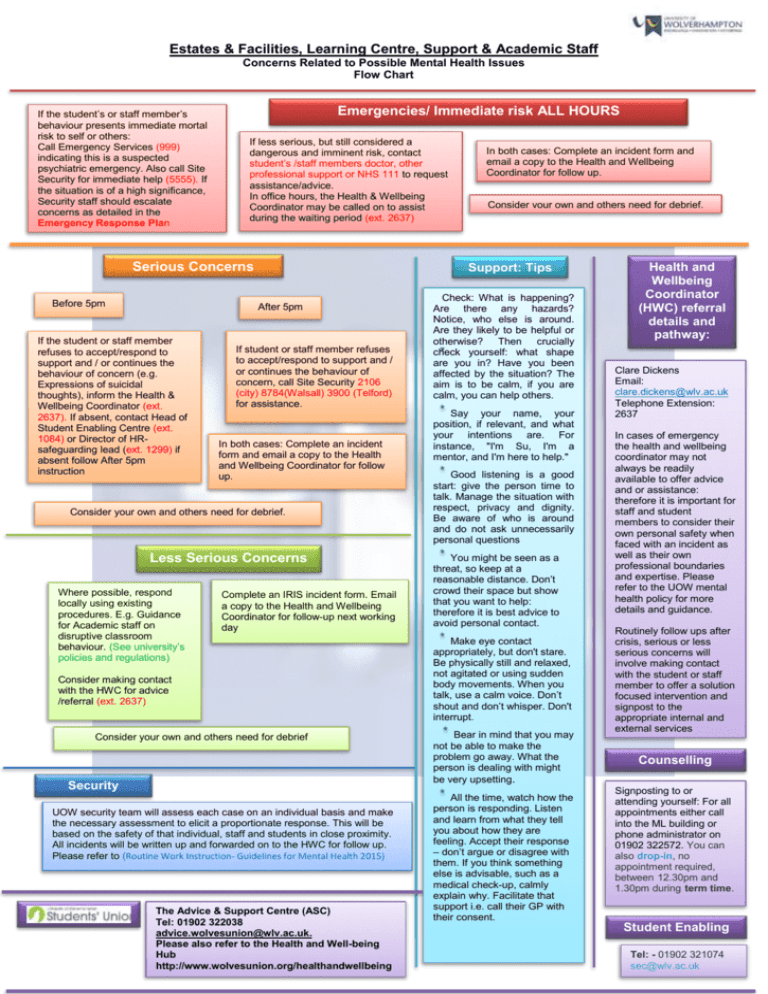
Estates & Facilities, Learning Centre, Support & Academic Staff Concerns Related to Possible Mental Health Issues Flow Chart If the student’s or staff member’s behaviour presents immediate mortal risk to self or others: Call Emergency Services (999) indicating this is a suspected psychiatric emergency. Also call Site Security for immediate help (5555). If the situation is of a high significance, Security staff should escalate concerns as detailed in the Emergency Response Plan Emergencies/ Immediate risk ALL HOURS If less serious, but still considered a dangerous and imminent risk, contact student’s /staff members doctor, other professional support or NHS 111 to request assistance/advice. In office hours, the Health & Wellbeing Coordinator may be called on to assist during the waiting period (ext. 2637) Serious Concerns Before 5pm If student or staff member refuses to accept/respond to support and / or continues the behaviour of concern, call Site Security 2106 (city) 8784(Walsall) 3900 (Telford) for assistance. In both cases: Complete an incident form and email a copy to the Health and Wellbeing Coordinator for follow up. Consider your own and others need for debrief. Less Serious Concerns Where possible, respond locally using existing procedures. E.g. Guidance for Academic staff on disruptive classroom behaviour. (See university’s policies and regulations) Consider your own and others need for debrief. Support: Tips After 5pm If the student or staff member refuses to accept/respond to support and / or continues the behaviour of concern (e.g. Expressions of suicidal thoughts), inform the Health & Wellbeing Coordinator (ext. 2637). If absent, contact Head of Student Enabling Centre (ext. 1084) or Director of HRsafeguarding lead (ext. 1299) if absent follow After 5pm instruction In both cases: Complete an incident form and email a copy to the Health and Wellbeing Coordinator for follow up. Complete an IRIS incident form. Email a copy to the Health and Wellbeing Coordinator for follow-up next working day Consider making contact with the HWC for advice /referral (ext. 2637) Consider your own and others need for debrief Security UOW security team will assess each case on an individual basis and make the necessary assessment to elicit a proportionate response. This will be based on the safety of that individual, staff and students in close proximity. All incidents will be written up and forwarded on to the HWC for follow up. Please refer to (Routine Work Instruction- Guidelines for Mental Health 2015) The Advice & Support Centre (ASC) Tel: 01902 322038 advice.wolvesunion@wlv.ac.uk. Please also refer to the Health and Well-being Hub http://www.wolvesunion.org/healthandwellbeing hub/healthymind/ Check: What is happening? Are there any hazards? Notice, who else is around. Are they likely to be helpful or otherwise? Then crucially check yourself: what shape are you in? Have you been affected by the situation? The aim is to be calm, if you are calm, you can help others. Say your name, your position, if relevant, and what your intentions are. For instance, "I'm Su, I'm a mentor, and I'm here to help." Good listening is a good start: give the person time to talk. Manage the situation with respect, privacy and dignity. Be aware of who is around and do not ask unnecessarily personal questions You might be seen as a threat, so keep at a reasonable distance. Don’t crowd their space but show that you want to help: therefore it is best advice to avoid personal contact. Make eye contact appropriately, but don't stare. Be physically still and relaxed, not agitated or using sudden body movements. When you talk, use a calm voice. Don’t shout and don’t whisper. Don't interrupt. Bear in mind that you may not be able to make the problem go away. What the person is dealing with might be very upsetting. All the time, watch how the person is responding. Listen and learn from what they tell you about how they are feeling. Accept their response – don’t argue or disagree with them. If you think something else is advisable, such as a medical check-up, calmly explain why. Facilitate that support i.e. call their GP with their consent. Health and Wellbeing Coordinator (HWC) referral details and pathway: Clare Dickens Email: clare.dickens@wlv.ac.uk Telephone Extension: 2637 In cases of emergency the health and wellbeing coordinator may not always be readily available to offer advice and or assistance: therefore it is important for staff and student members to consider their own personal safety when faced with an incident as well as their own professional boundaries and expertise. Please refer to the UOW mental health policy for more details and guidance. Routinely follow ups after crisis, serious or less serious concerns will involve making contact with the student or staff member to offer a solution focused intervention and signpost to the appropriate internal and external services Counselling Signposting to or attending yourself: For all appointments either call into the ML building or phone administrator on 01902 322572. You can also drop-in, no appointment required, between 12.30pm and 1.30pm during term time. Email: Student Enabling counsellingservices @wlv.ac.uk Tel: - 01902 321074 sec@wlv.ac.uk



